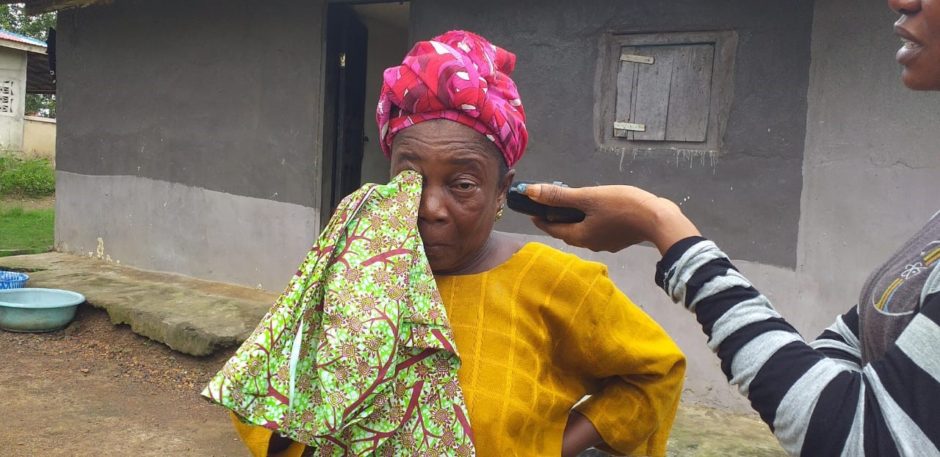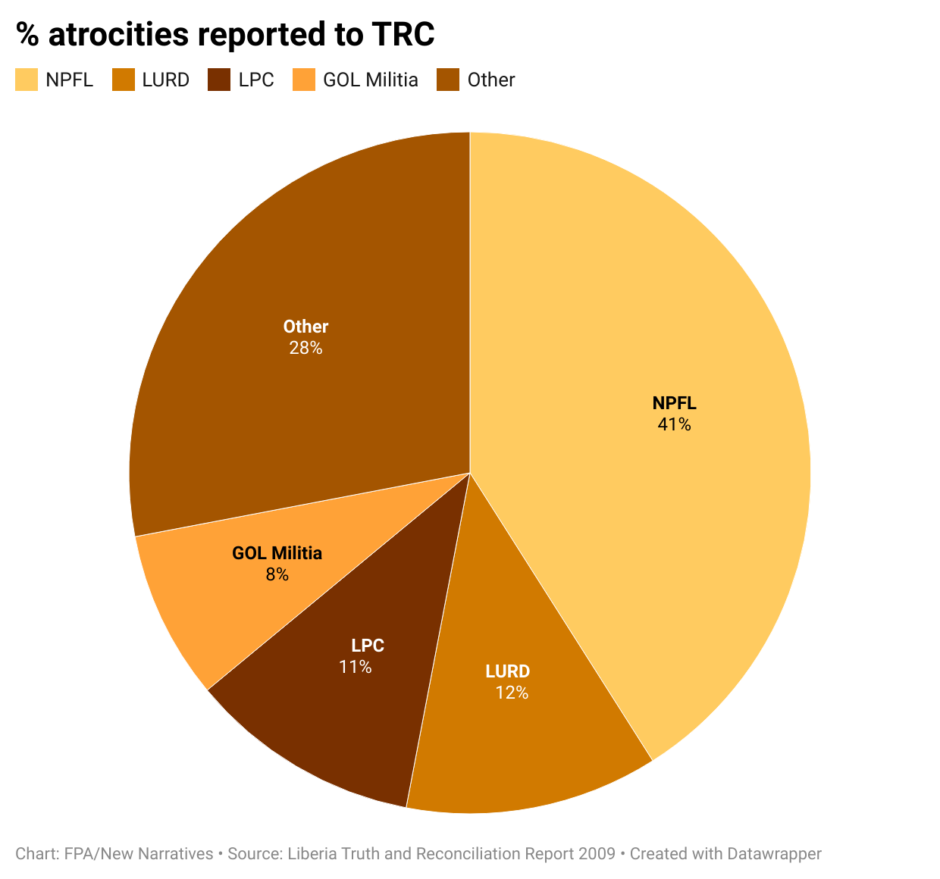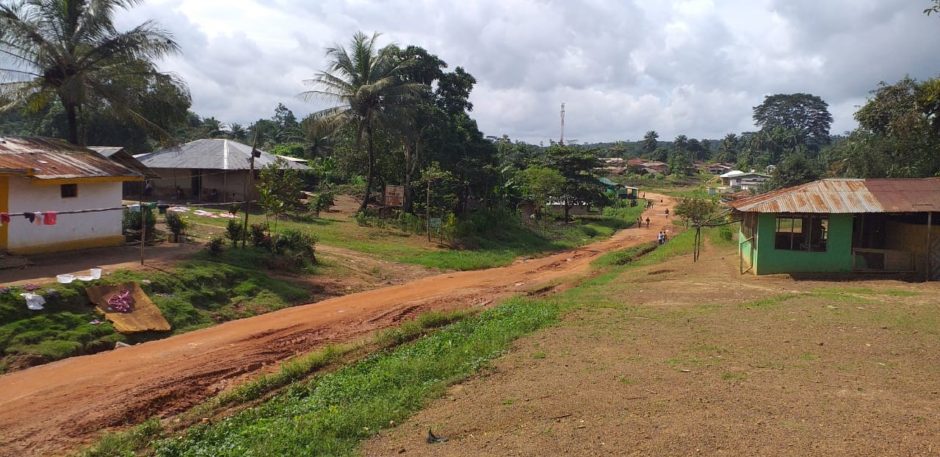
GBARMA, Gbarpolu County – Miatta Gray wept as she recalled the day, nearly 20 years ago, that rebels with the absurdly named “Liberians United for Reconciliation and Democracy” (LURD) upended her life. Mrs. Gray said the rebels arrived here with a friendly request that everyone assemble in the town square for a meeting. Then the killing started.
“I lost everything. No brother, no sister and no children,” said Mrs. Gray, now in her 60’s, wiping tears with her lappa. She said the rebels first killed with gunfire, then they cut down any survivors with machetes. “They killed everybody. Fifteen people died from me that day. My husband, children, sister, my sister’s husband and my small brother.”
“Too much blood wasted all over the town,” sobbed Musu Norman, another survivor now in her 50s, who lost her husband and children that day. “When you turn right you see body, you turn left, body.”
One Hundred Ten villagers died in what became known as the Gbarma Massacre. The suffering of the people continued for days.
“They started to rape our girl children, beating and killing our people, eating human hearts and doing all kinds of wicked activities,” said Mambu Kaba, the Assistant Dean of Elders in Gbarma District. “We were living in hell under LURD.”
LURD was responsible for many massacres between 2000 and 2003 in Lofa, Gbarpolu, Grand Cape Mount, Bomi and Montserrado Counties according to Liberia’s Truth and Reconciliation Commission Report. The TRC ranked LURD as the second deadliest faction during both civil wars, even though it was active for just four of the 14 years of conflict. The Commission recorded nearly 19,000 human rights violations by LURD or 12 percent of the crimes reported to it.
And yet, until August last year, not one member of LURD had faced any form of justice. Ex-combatants from the Armed Forces of Liberia, National Patriotic Front for Liberia and ULIMO have been charged and tried around the world. But last year in London, Jankuba Fofana, a former frontline commander for LURD, was arrested and held under Section 51 of the U.K.’s International Criminal Court Act 2001, which covers genocide, crimes against humanity and war crimes. Fofana, 45, was released as investigations continued. London’s Metropolitan Police have not given an update on the case. UK courts have slowed down hearings because of the pandemic.

Fofana’s arrest was welcomed by some in Gbarma.
“The arrest of Fofona gives the people of Gbarma hope that we will get justice,” said local resident David Sumo. “Even though we will not get back our people that we lost during the war, their souls will find rest. Because I know they are crying for justice.”
Fofana was a major player in the civil war and was at the center of ceasefire talks between then-President Charles Taylor’s forces and LURD in the final months of the war in 2003 before LURD’s assaults on Monrovia helped persuade Taylor to resign and go into exile.
LURD, with Sekou Damante Conneh as its chairman, was comprised mostly of the Mandingo and Krahn ethnic groups, remnants of then-defunct ‘ULIMO K and J’, which had disbanded at the end of the first civil war with the election of Taylor as president in 1997.
LURD was founded in 1999, barely two years into the Taylor administration. The president’s continued repressive policies at home, and the support for rebels in neighboring countries, fueled armed opposition from outside of Liberia. LURD, along with the Movement for Democracy in Liberia (MODEL) another rebel faction from southeastern Liberia, launched an offensive against his government that would mark the second Liberian civil war.
Many ULIMO fighters, like Fofana, became key figures of LURD.

Life under LURD – ‘Too ugly to Live’
Under Fofana and co-fighters like Ophorie Diah who commanded the Gbarma massacre according to the TRC, LURD committed some of the worst atrocities of the war. In the Black Saturday Massacre in Lofa County the TRC found LURD massacred civilians of Voinjama City. During the killing fighters compelled a woman to carry around the mutilated remains of her children, sister and husband in a wheel barrow as meat on sale and the local population was compelled to buy them.
TRC Report says during the period from 2001-2003 between 750 and 1,000 civilians including pregnant women, children and elderly were forced to carry ammunition, food and personal belongings looted from towns and villages in Gbarpolu to the Guinean border. Along the way women were raped. When people were tired or hungry they were often killed in brutal ways. In a war already filled with astounding atrocities LURD stood out.
“My uncle was killed because of the way God made him,” said Varmah Konneh, a survivor who now serves as principal of Gbarma Central High School. “When they saw him, they said he was too ugly so there was no need for him to live among other people. And because of that he was shot and died on the spot.”
Konneh also told FrontPage Africa that his late father and father’s friend were abducted and made to carry loads. In order to stop them from escaping, he said the soldiers chained them together. But when they could no longer continue the journey because they were tired, the soldiers made their heads collide repeatedly by swinging the chains and they eventually died of internal bleeding caused by the collisions.
“I still can’t believe that human beings will treat their fellow humans in such a manner. I wasn’t able to see my father before he died, but those that were there said he and his friends were treated like animals,” said Konneh, looking to the sky in an effort to stop his tears.
LURD’s activities in its early stage of formation were marked by incursions and sporadic skirmishes or hit and run attacks along the Liberian-Guinean border. But with support from Sierra Leone, Guinea and the United States, LURD began attacking the government of Taylor with U.S. made weaponry. Testifying before the TRC in 2008, LURD Chairman Conneh said that during the war, Sierra Leone and Guinea had allowed LURD rebels free passage “through their borders with our arms without any questions from them.”
The faction established its headquarters in Voinjama, the capital of Lofa County. There, it continued its advancement, ravaging towns and villages along the main route from Voinjama to Bopolu, Gbarma and Tubmanburg, (where it relocated its headquarters) and then onto Montserrado. By June 4, 2003, it had besieged almost the entire northwestern corridor and was at Double Bridge on Bushrod Island and engaged in intensive fighting with government troops. In those turbulent days, Monrovia came under heavy attacks and the group was accused of firing mortar shells into civilian areas of the city killing dozens of people. Though LURD did not capture Monrovia, observers believe that its sustained attacks coupled with the advancement of MODEL from the southeastern front, pressured Taylor to resign his post and leave for Calabar, Nigeria on August 11, 2003 ending Liberia’s 14 years of conflict.
Part 2 of this series continues tomorrow.
This series was a collaboration with New Narratives as part of the West Africa Justice Reporting Project.
